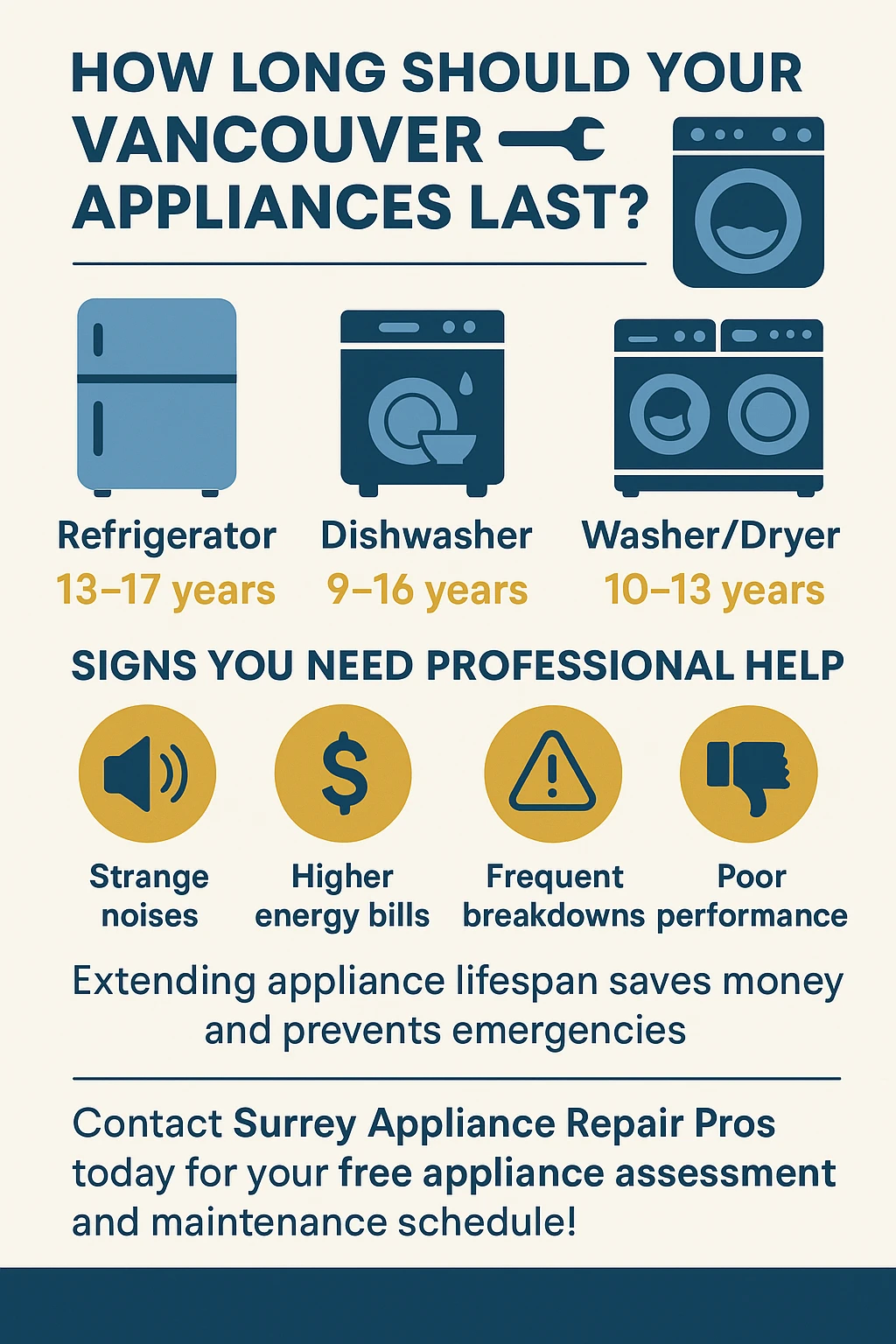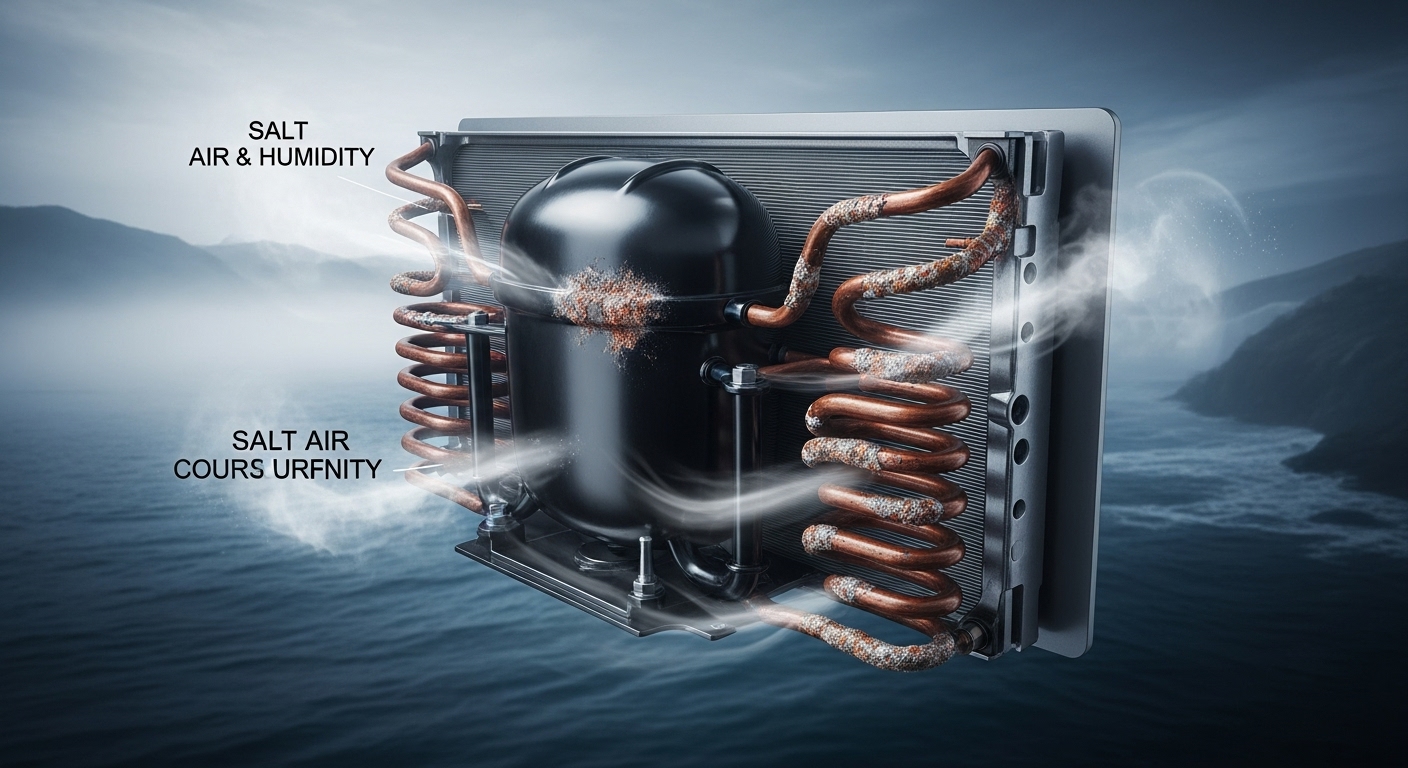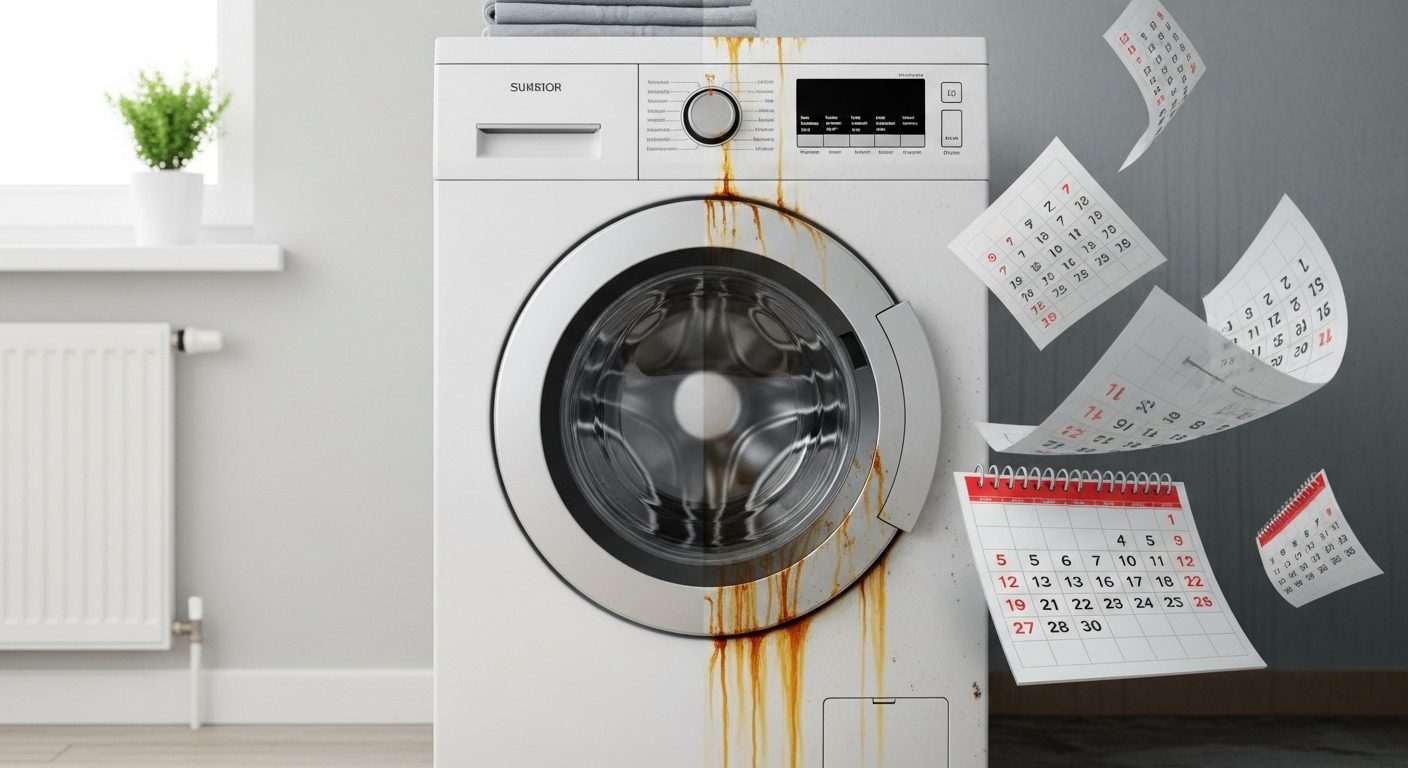Wondering why your brand-new dishwasher is already showing white residue or your refrigerator compressor sounds like it’s working overtime? Vancouver’s unique coastal climate creates hidden challenges that can slash appliance lifespans by up to 30% compared to inland locations, turning reliable household helpers into expensive repair headaches faster than most homeowners expect.
Picture this: you’ve just moved into your dream Vancouver home and invested thousands in beautiful stainless steel appliances. Six months later, your washing machine develops that telltale musty smell, your dryer takes twice as long to dry clothes, and mysterious white spots appear on your dishwasher’s interior. What seemed like isolated incidents actually represents the systematic impact of our coastal environment on modern appliances.
Living between the Pacific Ocean and Coast Mountains creates a perfect storm of environmental challenges that most appliance manufacturers never account for in their warranty calculations. Our persistent humidity levels regularly exceed the 30-50% range that most appliances were designed to handle, while salt-laden ocean breezes penetrate surprisingly far inland, affecting homes in Burnaby, Richmond, and even Surrey with corrosive particles that gradually destroy internal components.
The financial implications extend far beyond simple repair bills. When your refrigerator’s compressor fails early due to salt air corrosion, or your front-loading washer needs seal replacement at year seven instead of year twelve, you’re facing emergency costs during Vancouver’s expensive real estate market. Understanding these unique challenges and implementing strategic maintenance approaches can extend appliance life by 3-5 years while preventing most of the catastrophic failures that turn weekend plans into expensive emergency service calls.
Key Outtakes:
- Vancouver’s coastal climate reduces appliance lifespan by 20-30% compared to interior locations due to salt air corrosion and persistent humidity exposure
- The 50% repair rule suggests replacement when repair costs exceed half of replacement value, but Vancouver’s environmental factors often justify earlier replacement
- Proper maintenance can extend appliance lifespan by 40-50% while preventing 85% of common environmental failures
- Energy-efficient replacements often pay for themselves within 3-5 years through reduced electricity consumption, especially important given Vancouver’s high utility costs
- Strategic replacement planning prevents emergency situations and enables cost optimization through advance shopping and installation scheduling

Understanding Vancouver’s Appliance Environment
Vancouver’s geographic position creates environmental conditions that systematically attack household appliances in ways that generic maintenance guides never address. Our marine climate generates challenges that differ fundamentally from the prairie extremes or desert conditions that dominate North American appliance testing protocols. The combination of persistent moisture, salt air penetration, and moderate temperature fluctuations creates accelerated wear patterns that can reduce expected appliance lifespans by several years.
Salt air doesn’t just affect waterfront properties as many homeowners assume. During storms or high wind conditions, salt particles travel up to 25 kilometers inland, affecting appliances in Burnaby, Richmond, and Surrey with corrosive deposits that gradually accumulate on internal components. Recent analysis of appliance failures shows that homes within this radius experience refrigerator coil corrosion and dryer vent deterioration at rates significantly higher than national averages.
The humidity factor creates its own category of problems that amplify normal wear processes. Vancouver’s rainy season pushes indoor humidity levels above 60% for extended periods, well beyond the design specifications for most household appliances. This elevated moisture penetrates into appliance interiors through normal ventilation openings, creating conditions where electronic control boards fail prematurely and metal components corrode from the inside out.

Temperature cycling, while moderate compared to other Canadian cities, still subjects appliances to constant expansion and contraction stress. Unlike consistently cold climates where materials stabilize at low temperatures, Vancouver’s fluctuating conditions cause seals to crack, connections to loosen, and components to develop micro-fractures that eventually lead to catastrophic failures. The freeze-thaw patterns that occur several times each winter create particular stress on outdoor units and appliances positioned in unheated areas.
Understanding these environmental challenges helps explain why standard manufacturer warranties often prove inadequate for Vancouver conditions, and why maintenance schedules designed for average North American conditions fail to prevent premature failures in our coastal environment. The key insight is recognizing that Vancouver appliances face accelerated aging processes that require more frequent attention and earlier replacement planning than homeowners in other regions experience.
Typical Appliance Lifespans in Vancouver Conditions
National appliance lifespan data provides a starting point for replacement planning, but these averages systematically overstate the durability homeowners can expect under Vancouver’s challenging conditions. Industry research indicates that refrigerators typically last 10-18 years, washing machines operate for 10-13 years, and dishwashers provide reliable service for 9-16 years under optimal conditions. However, Vancouver’s coastal environment compresses these timelines significantly.

Refrigerators face particular challenges in our humid, salt-laden atmosphere, with practical lifespans often reduced to 8-15 years depending on maintenance quality and placement within the home. The constant moisture exposure forces cooling systems to work harder, while salt deposits on condenser coils reduce heat transfer efficiency and increase compressor workload. Homes within 10 kilometers of the waterfront typically experience the shorter end of this range, while properties in drier inland areas may achieve lifespans closer to national averages.
Front-loading washing machines, popular in Vancouver condos due to space constraints, develop persistent problems around the 7-10 year mark rather than the 10-13 years expected nationally. The horizontal drum design combined with our humid climate creates perfect conditions for mold growth in door seals, while the contained moisture environment accelerates bearing deterioration. Top-loading washers generally perform better in our climate, often reaching 8-12 years of reliable operation.
Dishwashers encounter unique challenges from Vancouver’s hard water conditions, particularly prevalent in Richmond and parts of Burnaby. Mineral buildup damages heating elements and pumps, typically requiring major repairs or replacement by year 6-9 rather than the 9-16 years achievable in soft water areas. The combination of mineral deposits and coastal humidity creates scale formations that reduce cleaning effectiveness and stress internal components beyond their design limits.
Dryers work significantly harder in Vancouver’s climate, processing consistently damp clothing throughout extended rainy seasons while fighting humidity infiltration through ventilation systems. Practical lifespans often compress to 8-12 years, with heating elements, moisture sensors, and electronic controls failing earlier due to moisture exposure and increased operational demands. The need for longer drying cycles throughout much of the year accelerates normal wear patterns and increases energy consumption substantially.
The 50% Rule and When to Replace vs Repair
The widely recognized 50% rule provides a foundational framework for repair versus replacement decisions, stating that repairs costing more than half the price of comparable new appliances typically justify replacement rather than repair. However, this simplified guideline requires significant modification for Vancouver conditions, where environmental factors, energy efficiency improvements, and accelerated aging patterns create additional decision-making complexity.

Appliance age becomes the critical modifier in Vancouver’s challenging environment. For units under 8 years old, most repairs prove economically justifiable even when approaching the 50% threshold, assuming the appliance hasn’t suffered extensive environmental damage from salt air or moisture. However, once appliances exceed 10 years of age in coastal conditions, the probability of additional failures within 12-24 months increases dramatically, making repair investments questionable even for seemingly reasonable costs.
Environmental damage assessment requires particular attention in Vancouver homes. Professional repair services report that appliances showing visible signs of salt air corrosion or moisture damage often have significantly reduced remaining lifespans compared to similar-age units in other climates. A 9-year-old refrigerator with corroded coils may have only 1-3 years of reliable operation remaining, making expensive repairs economically questionable despite the unit’s relatively young age.
The energy efficiency differential between older and newer appliances creates compelling replacement arguments that exten

